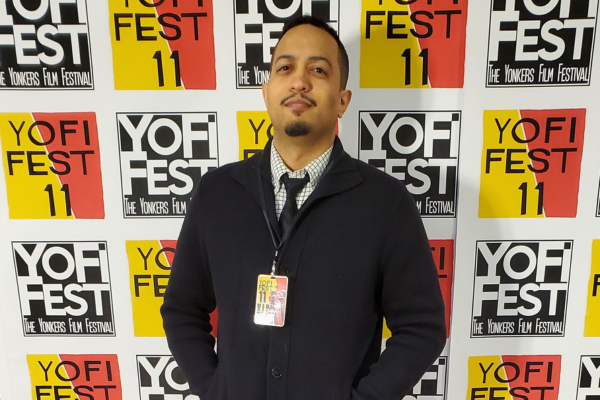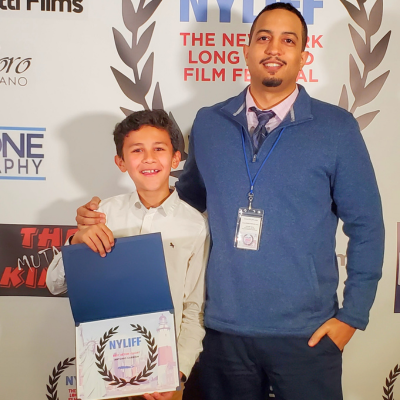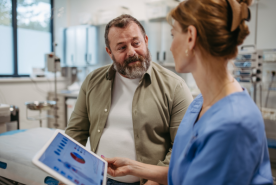September 18, 2025
After decades of kidney pain, Eddie discovered he had UPJ obstruction. Learn how surgery gave him relief and a new outlook on life.
For most of Eddie Castro Jr.'s life, he lived with debilitating and near-constant abdominal and back pain. It started in early childhood, following Eddie into adulthood.
Only in his 20s did he learn that a congenital kidney condition called ureteropelvic junction (UPJ) obstruction caused it.
Now Eddie's sharing his story to encourage others to take control of their kidney health.
Living with Constant Pain
Eddie doesn't remember a time when he didn't experience kidney pain.
"It started when I was five in 1985," Eddie said. "Back then, doctors couldn't figure it out. The technology just wasn't there."
His doctors assumed he'd grow out of it. But as time passed, the pain continued.
"I'd be curled up on the floor in constant pain," said Eddie. "My mother noticed that certain foods like broccoli or soda made it worse."
His family even turned to a shaman while visiting family in the Dominican Republic. But nothing worked.
"I kept adding foods to my 'do-not-eat' list and tried to ignore the pain," Eddie said. "I didn't get answers until my twenties."
A Ureteropelvic Junction (UPJ) Obstruction
Now in his twenties with a job and health insurance, Eddie decided it was time to get to the bottom of the pain.
"My doctor ran me through ultrasounds, MRIs, and a CT scan, where a contrast dye is used to monitor how well each kidney drains."
Finally, Eddie had his answer. He had a blockage called ureteropelvic junction (UPJ) obstruction.
"It is congenital, meaning I had this from birth," Eddie explained. "My left ureter, a tube that moves urine from the kidneys to the bladder, was narrowed, blocking the flow of urine.”
The blockage caused urine to back up and his kidney to swell, a condition called hydronephrosis.
"It felt like they were being squeezed," Eddie said. "Finally getting an answer, and knowing it was treatable, was a huge relief."
Subscribe today!
Join the NKF Blog Newsletter
Get inspirational stories and kidney disease resources delivered to your inbox every month. You'll gain practical insights and expert advice to help you better understand and manage your kidney health, no matter where you are on your kidney journey.
Treating UPJ
Eddie was scheduled for a surgery called a pyeloplasty in 2004.
"They removed the narrowed section of my ureter and reconnected the healthy ends," said Eddie. "I also got a temporary stent to keep the ureter open during the healing process."
The results were incredible. For the first time in his life, Eddie was pain-free.
"I couldn't believe the difference. It was unreal," Eddie said. "I recovered quickly. Many of my diet restrictions were lifted. I could sit without pain for the first time in my life."
But Eddie's doctor warned him that UPJ obstructions can recur due to scarring.
"He predicted I'd need a second surgery within 15 to 20 years. When the pain started back up in 2021, I knew he was right."
This time, Eddie received a buccal mucosal graft pyeloplasty, a specialized surgery used to repair the damaged ureter.
"They cut out the scarred part of my ureter and reconstructed it using tissue from the inside of my cheek," Eddie said. "This created a new, open channel for urine to flow through."
Recovery was more challenging the second time, but the outcome was worth it.
"I think it took longer to get back to normal since I was older," Eddie said. "But I wouldn't trade the results for the world."
Other than avoiding carbonated drinks, excess sodium, and diuretics like coffee, Eddie can eat and drink what he wants. More importantly, he can live life pain-free.
A Creative Outlet
For Eddie, writing and making films became a way to cope with his health struggles. Telling stories helped him turn pain into hope..
"My work is inspired by my life," Eddie said. "My characters start in a dark place, but they have hope or a renewal at the end."
His short film "Shots" is a perfect example. "Shots" tells the story of a young boy who is bullied at school and at home.
"He comes out of the hardship a new person," Eddie said. "He learns things that he'll take with him the rest of his life–just like I did."
The film was featured at nine film festivals, something Eddie still finds hard to believe.
"Movies are magic. You write it, but it takes on a life of its own," Eddie said. “They become more than what you imagined.”
Eddie believes hard times can lead to growth. That’s why he’s sharing his kidney story with the National Kidney Foundation (NKF).
“I need people to know that they don't have to suffer. You can take steps to change your life,” Eddie said. “Get your kidneys checked out and advocate for yourself. You are worth it."
Are you at risk of kidney disease? Take our one-minute quiz to find out.



















